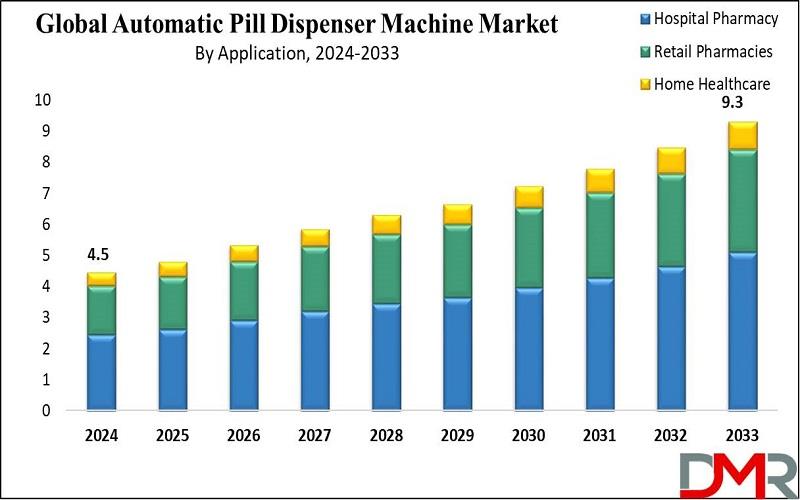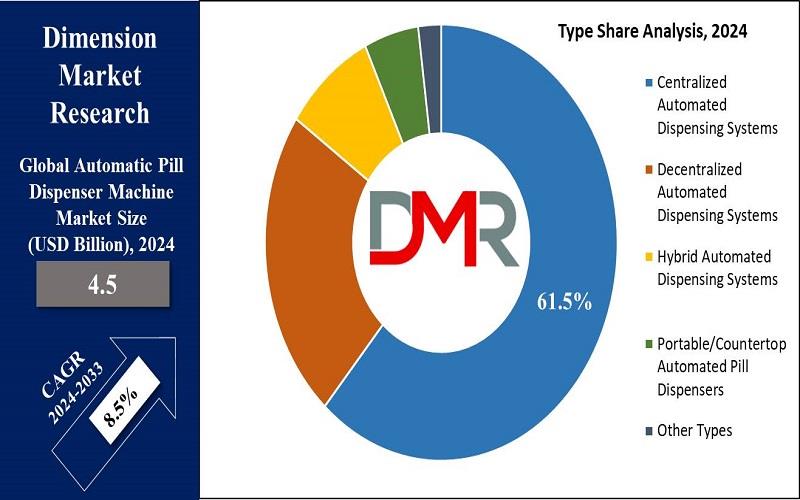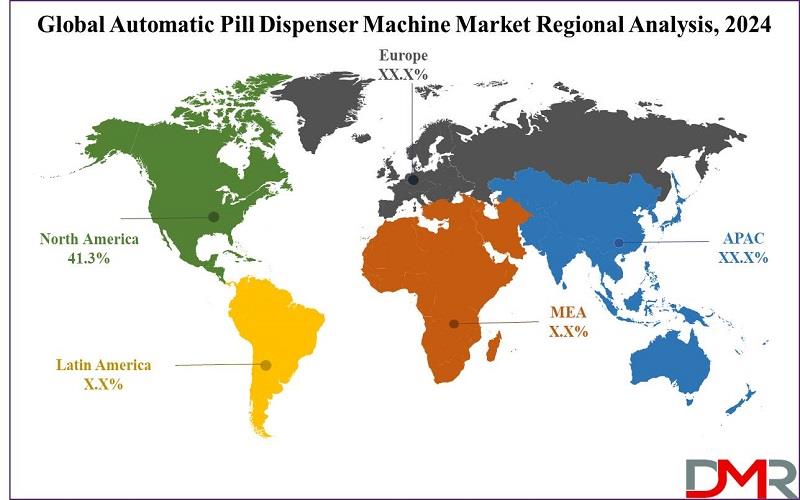
Automatic Pill Dispenser Machine Market Is Expected To Reach Revenue Of USD 9.3 Bn By 2033, At 8.5% CAGR: Dimension Market Research
| Report Highlights | Details |
| Market Size (2024) | USD 4.5 Bn |
| Forecast Value (2033) | USD 9.3 Bn |
| CAGR (2024-2033) | 8.5% |
| North America Revenue Share (2024) | 41.3% |
| The US Market Size (2024) | USD 1.6 Bn |
| Historical Data | 2018 - 2023 |
| Forecast Data | 2024 - 2033 |
| Base Year | 2023 |
| Estimate Year | 2024 |
| Segments Covered | By Type, By Technology, By Application |
| Regional Coverage | North America, Europe, Asia Pacific, Latin America, Middle East & Africa (MEA) |
Market Analysis
Centralized Automated Dispensing Systems will continue to dominate the type segment, holding a market share of 61.5% in 2024. Centralized automated medication dispensing systems centrally manage large volumes of medications within a hospital more effectively by streamlining the processes of storage, dispensing, and tracking while reducing errors and allowing for optimization of workflows.
Their integration with Electronic Health Records and Hospital Information Systems enhances real-time tracking and improves patient outcomes. To add, centralized systems also ensure health regulations by automating documentation, inventory control, and reducing wastage.
Their ability to streamline operations at the hospital pharmacy and raise patient safety makes them key drivers in growth amongst automatic pill dispensers.
Purchase the Competition Analysis Dashboard Today:
Automatic Pill Dispenser Machine Market Segmentation
By Type
- Centralized Automated Dispensing Systems Decentralized Automated Dispensing Systems Hybrid Automated Dispensing Systems Portable/Countertop Automated Pill Dispensers Other Types
By Technology
- RFID-Based Systems Barcode-Based Systems
By Application
- Hospital Pharmacy Retail Pharmacies Home Healthcare
Growth Drivers
- Aging Population and Geriatric Care: Demand for the same from regions such as North America and Europe will keep an affordable balance due to continuous growth in the number of the elderly population. Such automated pill dispensers assist in managing complex medication regimens and reduce the rate of missed doses. Emphasis on Reducing Medication Errors: Automated dispensers minimize human error in medication management, improving patient safety. As a result, hospitals and home healthcare providers are adopting these systems to reduce liability and enhance care quality.
Restraints
- Apt improvement in the growth factor of healthcare infrastructure and increasing awareness about automated solutions can be provided to a certain extent by APAC and Latin America. Demand for automated pill dispensers is likely to increase as these regions continue to develop. The modernization of AI and IoT offers possibilities for real-time monitoring along with personalized medication schedules. Companies will have an advantage if they invest in this technology, especially if their markets are advanced in terms of their healthcare systems. Portable and countertop pill dispensers are, therefore, in great demand with rising home health care, hence presenting market expansion opportunities in home-use settings.
Growth Opportunities
- High costs of acquisition, installation, and maintenance inhibit the high cost of automation in automated pill dispensers, especially for smaller healthcare providers, which limits market penetration in low-budget amenities. Poor awareness and poor healthcare infrastructure are seen in underdeveloped regions, and hence, automated pill dispensers cannot see high adoption rates in these areas; hence, this is one region that affects market growth detrimentally. Incompatibility with installed healthcare IT infrastructure, including electronic health records, is one of the reasons for the lower adoption rate of automated dispensers. Fully seamless integration between new and legacy systems remains a challenge, especially for large organizations.
Regional Analysis
The North American region is also expected to seize the largest share of 41.3% in the global automatic pill dispenser market by 2024, driven by advanced healthcare infrastructure, high healthcare expenditure, and greater emphasis on innovative technologies.
The U.S. holds the top position in deploying automated systems in hospitals and home care to minimize medication errors, mainly among the rising aged population. The growth in chronic diseases like diabetes fuels the demand of the market.
The technological advancement integrated into the system such as RFID, and EHR propels the market demand. Major players such as McKesson and Cerner are situated hence a competitive advantage is considered to play to North America's leadership along with the regulatory requirements.
Request Your Exclusive Sample Report at
By Region
North America
- The U.S. Canada
Europe
- Germany The U.K. France Italy Russia Spain Benelux Nordic Rest of Europe
Asia-Pacific
- China Japan South Korea India ANZ ASEAN Rest of Asia-Pacific
Latin America
- Brazil Mexico Argentina Colombia Rest of Latin America
Middle East & Africa
- Saudi Arabia UAE South Africa Israel Egypt Rest of MEA
Discover additional reports tailored to your industry needs
- Blood Sensor Market size is expected to reach a value of USD 12.6 billion in 2024, and it is further anticipated to reach a market value of USD 28.4 billion by 2033 at a CAGR of 9.4%. Lactation Support Supplements Market is expected to reach a value of USD 703.2 million in 2023, and it is further anticipated to reach a market value of USD 1,334.1 million by 2032 at a CAGR of 7.4%. Specialty Pharmaceutical Market is projected to reach a value of USD 81.6 billion in 2023 & USD 205.2 billion in 2032 with the anticipated CAGR of 10.8% during the forecast period (2023-2032). Optoelectronics Market is projected to reach a market value of USD 50.2 billion by the end of 2023 and is further anticipated to grow the market value of USD 86.5 billion by 2032, at a CAGR of 6.2%. Oncology Market is expected to reach a value of USD 234.6 billion in 2023, and it is further anticipated to reach a market value of USD 533.2 billion by 2032 at a CAGR of 9.6%. Insulin Pump Market is expected to reach a market value of USD 6.5 billion in 2023 and is further anticipated to reach a value of USD 28.0 billion at a CAGR of 17.6% for the forecast period (2023-2032). Hand Sanitizers Market is expected to hold a market value of USD 7.3 billion in 2023 and is projected to show subsequent growth with a market value of USD 13.6 billion in 2032 at a CAGR of 7.2%. exoskeleton Market is expected to reach a value of USD 417.7 million in 2023, and it is further anticipated to reach a market value of USD 1,903.3 million by 2032 at a CAGR of 18.4%. Dental Implant Market is expected to reach a value of USD 5.3 billion in 2023, and it is further anticipated to reach a market value of USD 13.3 billion by 2032 at a CAGR of 10.7%. Breast Pump Market is expected to be valued of USD 3.2 billion in 2023 & USD 7.0 billion in 2032, and projections indicate a CAGR of 9.2% for the forecasted period of 2023 to 2032.
Recent Developments in the Automatic Pill Dispenser Machine Market
- August 2024: McKesson Corporation introduced an AI-driven pill dispenser solution featuring advanced RFID technology. This innovation enhances real-time medication tracking, reduces errors, and optimizes inventory management. July 2024: Yuyama Co. expanded its product line with a hybrid automated dispensing system, combining the strengths of both centralized and decentralized systems. June 2024: Becton, Dickinson, and Company (BD) launched portable automated pill dispensers designed for home healthcare which aim to improve medication adherence among elderly and chronically ill patients. April 2024: Baxter International Inc. announced the expansion of its U.S. manufacturing facilities to accommodate the rising demand for automated pill dispensers. March 2024: Talyst partnered with ScriptPro LLC to develop an integrated solution for hospital and retail pharmacies. February 2024: Cerner Corporation rolled out a cloud-based pill dispensing management system, enabling hospitals and home healthcare providers to monitor and control medication dispensing remotely. December 2023: Omnicell acquired Swisslog Healthcare, a leading provider of medication management and dispensing solutions, this acquisition strengthens Omnicell's portfolio. November 2023: Parata Systems launched an enhanced version of its RFID-based automated pill dispensers, offering improved medication tracking and security features. September 2023: Yuyama Co. expanded its global presence by partnering with new distributors in the Asia-Pacific and Middle East regions.
About Dimension Market Research (DMR)
Dimension Market Research (DMR) is a Market research and consulting firm based in India & US, with its headquarters located in the USA (New York). The company believes in providing the best and most valuable data to its customers using the best resources analysts work, to create unmatchable insights into the industries, and Markets while offering in-depth results of over 30 industries, and all major regions across the world.
We also believe that our clients don't always want what they see, so we provide customized reports as well, as per their specific requirements to create the best possible outcomes for them and enhance their business through our data and insights in every possible way.
CONTACT: United States 957 Route 33, Suite 12 #308 Hamilton Square, NJ-08690 Phone No.: +1 732 369 9777, +91 88267 74855 ...

Legal Disclaimer:
MENAFN provides the
information “as is” without warranty of any kind. We do not accept
any responsibility or liability for the accuracy, content, images,
videos, licenses, completeness, legality, or reliability of the information
contained in this article. If you have any complaints or copyright
issues related to this article, kindly contact the provider above.




















Comments
No comment